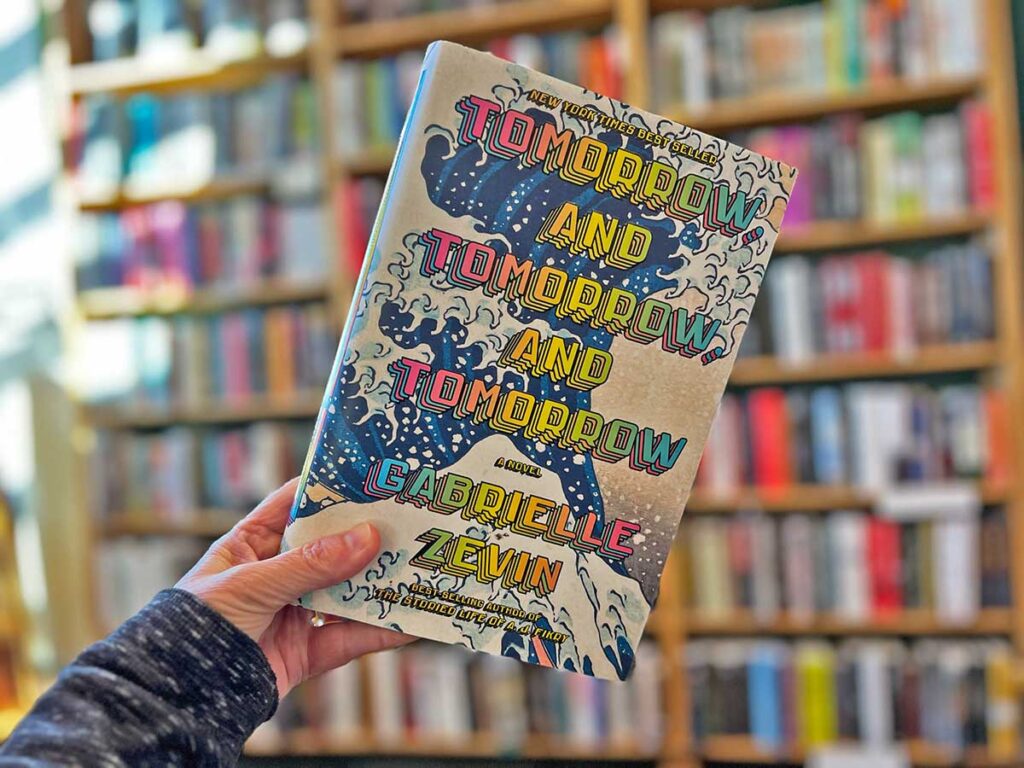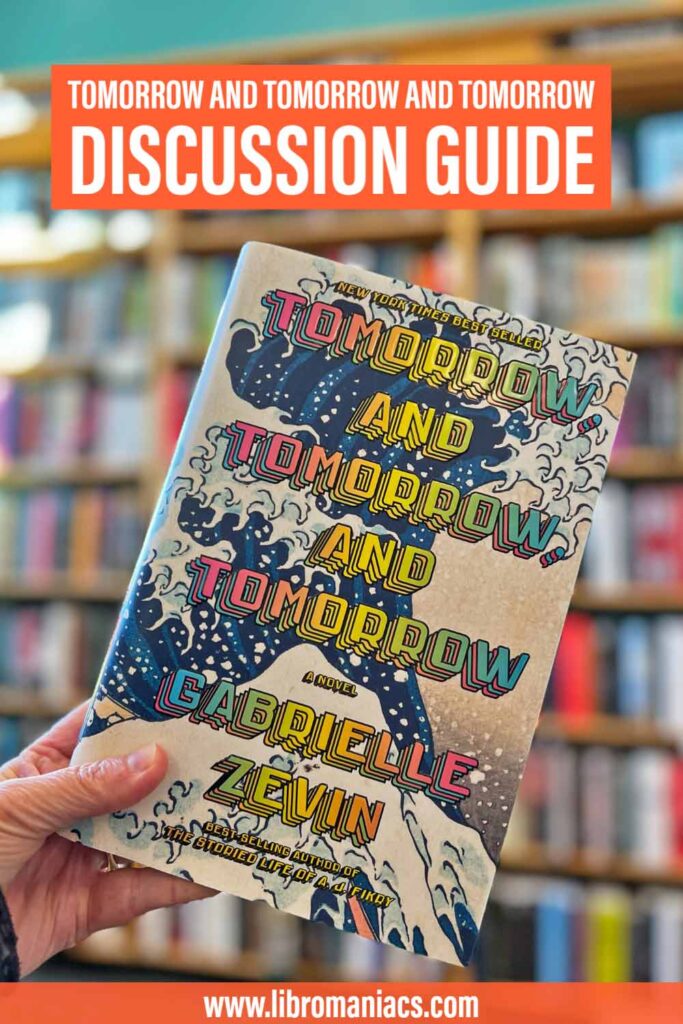Tomorrow, and Tomorrow, and Tomorrow is another heart-felt read from the author of The Storied Life of A.J. Fikrey. And like A.J. Fikrey, Tomorrow deals with themes of grief, loss and redemption. But it also tackles the distinctions between familial, romantic and friendship love, the creative process, and coming of age.
Our Tomorrow, and Tomorrow, and Tomorrow book club questions will help you unpack all of that, and we’re sure you’ll end up with a lively discussion. This Tomorrow discussion guide has a synopsis, 10 discussion prompts and some selected reviews, which you can use to compare to your own experience of the book.
And if you loved the book, scroll to the bottom to get ideas for some related reads.

(This article contains affiliate links. This means that if you choose to purchase, I’ll make a small commission.)
Tomorrow, and Tomorrow, and Tomorrow Synopsis
(We always chose to provide the publisher synopsis because we feel that it’s worthwhile to discuss whether the official book description actually squared with your experience of the book.)
Tomorrow, and Tomorrow, and Tomorrow, Gabriel Zevin
From the best-selling author of The Storied Life of A. J. Fikry: On a bitter-cold day, in the December of his junior year at Harvard, Sam Masur exits a subway car and sees, amid the hordes of people waiting on the platform, Sadie Green. He calls her name. For a moment, she pretends she hasn’t heard him, but then, she turns, and a game begins: a legendary collaboration that will launch them to stardom.
These friends, intimates since childhood, borrow money, beg favors, and, before even graduating college, they have created their first blockbuster, Ichigo. Overnight, the world is theirs. Not even twenty-five years old, Sam and Sadie are brilliant, successful, and rich, but these qualities won’t protect them from their own creative ambitions or the betrayals of their hearts.
Spanning thirty years, from Cambridge, Massachusetts, to Venice Beach, California, and lands in between and far beyond, Gabrielle Zevin’s Tomorrow, and Tomorrow, and Tomorrow examines the multifarious nature of identity, disability, failure, the redemptive possibilities in play, and above all, our need to connect: to be loved and to love.
Tomorrow, and Tomorrow, and Tomorrow Book Club Questions
These questions have been tailored to this book’s specific reading experience, but if you want more ideas, we also have an article with 101 generic book club questions.
- Marx, after playing Solution for the first time says “Your friend is sick as hell. And maybe a genius. How do you know him again?”
Notable in the quote is the “him”. Throughout the book, Sadie deals with sexism– the assumptions that it was Sam was the primary creator, or that she couldn’t be the face of the company. Have you experienced this sort of assumptive sexism in your life or work? - Sam’s mother, the suicide victim, and Marx’s mother all have the name Anna Lee. What was Zevin saying by making that choice?
- How did Sam’s part Korean identity influence the games?
- Sam’s mom Anna says “And this is the truth of any game— it can only exist in the moment it’s being played…in the end, all we can ever know is the game that we played, in the only world that we know”
Is this philosophy one that you subscribe to? Why or why not? - Are you a gamer? Are you familiar with the retro games or do you play MMOGs (massive multi-player online games? Did your familiarity with games (or lack thereof) matter to your enjoyment of the story?
- Sam says “The universe, he felt, was just— or if not just, fair enough. It might take your mother, but it might give you someone else in return.” And Marx says ““What is a game? It’s tomorrow, and tomorrow, and tomorrow. It’s the possibility of infinite rebirth, infinite redemption. The idea that if you keep playing, you could win. No loss is permanent, because nothing is permanent, ever.”
There is a quite a bit of grief and pain in the story, weren’t those losses permanent? Was there infinite redemption for the characters? - When Sadie first came up with the idea for Both Sides, she called it a “a glimmer of a notion of a nothing of a whisper of a figment of an idea.”
Have you ever had an idea like that? If so, what happened with it? - Sam worries that his “body cannot be relied upon” and that “he experienced his body as an antiquated joystick that could reliably move only in cardinal directions”
How did Sam’s unreliable body determine his character arc? - Reflect upon Zevin’s choice for Marx do an extended discourse while in his coma. How did you respond to it and what did it do for the story?
- After Marx’s death, there is a 5 year gap in the narrative before we pick back up with Sam and Sadie. What do you think happened at the company (or with the characters) during that break?
Selected Reviews for Tomorrow, and Tomorrow, and Tomorrow
“This story contains three decades worth of brilliance, creativity, friendship, love, romance. jealousy, resentment, isolation, miscommunication, and more. Maybe some huge successes require people to be somewhat broken and misunderstood. Definitely love does not have to be romantic to last a lifetime. When it comes to Sam and Sadie, it’s taken them years and years but I do think they finally mature in the end and there is something to be said for a maturity that might allow estranged people to come back together.”
“Sam and Sadie are both loveable, arrogant, infuriating, and flawed. The dynamics of their friendship are complicated by love, jealousy, and misunderstanding. I got a little sick of the friends to frenemies cycle between Sadie and Sam (more of Sadie’s anger towards Sam, but I understood her point of view). I loved them, but I also wanted to shake some sense in them.”
“I can see the many interesting themes the author is juggling here and have highlighted a few passages I thought were noteworthy, yet a few moments of brilliance just couldn’t make this book any less tedious for me. […] Kirkus assured me that even those who “have never played a video game in their lives” will love this book, but I feel like that probably isn’t true.”
“The story was dull and I found the author’s constant urge to stay woke to be obnoxious. While I respect her intention to raise awareness about pressing social concerns, I found that her preachiness frequently derailed the narrative and detracted from the plot. I find it fascinating when authors of fiction skillfully weave explorations of societal concerns into the fabric of their narratives. Unfortunately, in my opinion, Zevin did not carry out this action.”
3 Books Like Tomorrow, and Tomorrow and Tomorrow
Not a book…but you should check out Halt and Catch Fire. It’s a streaming series that deals with a group of smart folks who invent all manner of technological innovations, while also navigating their own fraught relationships.
Explore more fraught friendships with our book club guide for Little Fires Everywhere or coming of age with our Such a Fun Age guide.

Reamde, Neal Stephenson
After making a boatload of cash in the illegal marijuana trade, recluse Richard becomes immersed in an online fantasy game in which opposing factions battle for power and treasure. He uses the game to purchase “virtual coins”, using them to launder his ill gotten gain. Things get very real when a young Chinese “gold miner” cyber-hacks players and and tries to hold them hostage– including Richard’s own gaming company.
The plot then spills over into the read world with kidnappings, global intrigue, Russian gangsters, British spies, American survivalist nut jobs, terrorists and more.
This is a fun follow-up if you liked the gaming element of Tomorrow, and are keen for a lot of action.

All the Birds in the Sky, Charlie Jane Anders
The story follows two characters – Patricia (a witch who can talk to animals) and Laurence (a science genius, who built his own two-second time machine in middle school). They become friends during school but later part ways.
The book then picks up a decade later, where Patricia and Laurence become reacquainted. They themselves at odds with one another over an impending ecological crisis.
The book is a soft fantasy with big touches of magical realism,. It also offers an interesting philosophical commentary on how the fate of the world can rest in the hands of outsiders and non-conformists.
It’s a good follow-up for Tomorrow if you loved the fraught friendships and how they changed and matured over time.

The Goldfinch, Donna Tartt
Thirteen-year-old Theo Decker’s life is torn apart when a museum explosion injures him and kills his mother. During the event, he impulsively steals a painting, which he comes to covet as an homage to his mother. The book follows his life as he lives with his friend’s family, becomes involved with an antiquarian, lives for a time with his estranged father, and becomes acquainted a Russian mobster who covets the painting.
The book is a sprawling bildungsroman full of art, intrigue and life lessons.
Have a listen on Audible. Try audio books for free for 30 days.
Share these Tomorrow, and Tomorrow, Tomorrow book club questions with your friends:

